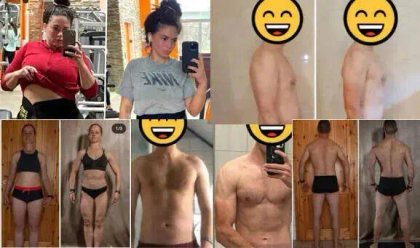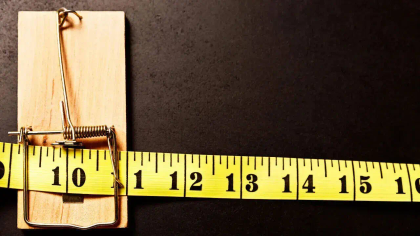The world is obsessed with the "ideal body."
TV
Ads
Social Media
They paint a picture of perfection, which we’ve been bombarded with since childhood.
It's easy to get caught up comparing yourself to these ideals and feel like you're not good enough.
But it's not just a toll on your mental well-being:
Science shows that your mind directly affects your body as well!
You’re more likely to be physically healthy if you have a healthy body image.
This makes it a crucial topic, for both our physical and mental health.
In this article, we'll cover the (counterintuitive) foundation of a healthy body image.
We'll dive deep into how to cultivate it and how it will help you reach your goals.
Because as you'll see, even some of the people who have the "ideal" body struggle with it.
Continue reading to learn more.
The self-improvement trap
Disclaimer: Self-esteem and body image are complex topics with a myriad of different facets (which are impossible to address all within one article). This article serves as a practical guideline. If you’re struggling with your mental health, please seek out individualized, professional help.
Here's how most people think about body image:
“Once I get in shape, I’ll feel good about myself!”
It’s a common belief (you might have too) that you’ll feel good, once you reach a certain goal.
But this is generally not true:
Over the last 12 years, I’ve met:
Influencers with 100k+ followers
Competitive bodybuilders
World-class powerlifters
Many of them - despite being in tremendous shape - still feel insecure about themselves.
Even celebrities, often portrayed as beauty icons, struggle with this.
Here’s a quote from actor Margot Robbie:
“Sometimes I feel good about showing skin and sometimes it doesn’t suit me at all. Some days I wake up with a lot of self-confidence – and sometimes I’m totally insecure.”
But it’s not just a struggle for women - men are affected too:
Here’s a quote from Taylor Lautner, who self-reported to have struggled with his body image during his role in the “Twilight” movies:
“Don't find happiness in what you want your body to look like. Don't think just because you lose the 20 pounds or put on the muscle, you're going to wake up, look in the mirror and all of a sudden be happy. That's not where you should be finding value.”
You can find hundreds of celebrities and influencers that spoke about similar challenges.
The main takeaway is this:
Your body-image entails more than the image you see in your mirror.
You can be totally insecure about yourself, despite looking like a fitness model or Hollywood star.
So what’s the real key to obtaining it?
We have to dig deeper…
The paradox of lasting change
This brings us to the key for a healthy body-image:
Self-ACCEPTANCE.
Nathaneal Brandon says it's the foundation of self-esteem and making real changes.
This can seem paradoxical at first.
You might think:
“But if I accept myself, even if I’m overweight or unfit, I won't have motivation to work on myself and improve my health!”
This isn’t true.
The problem is that healthy self-acceptance is widely misunderstood.
Here’s what self-acceptance is not:
Lowering your standards for your health
Getting complacent about your fitness goals
Ignoring external guidance and advice that would be helpful
Dismissing health risks associated with being overweight or unfit
Disregarding the notion that your life would improve if you improved your fitness
Here’s what *real *self-acceptance looks like:
Treating yourself with respect and compassion, instead of being hyper critical of yourself
Embracing that your own worth is not determined by your weight or appearance
Setting personal goals that inspire you and align with your highest values
Stop judging yourself for where you are right now in your fitness journey
Embracing the process, not just your desired the outcome
In short, it's about self-kindness, seeing things as they are, respecting yourself, and believing in your right to succeed.
Remember the feedback loop between your self-esteem and your behaviors:
If you increase your self-esteem, you'll not just feel better about yourself.
You'll naturally tend to act in a healthier way.
This is powerful:
You can feel good about yourself now, and get healthier
You don’t have to judge, guilt or shame yourself into taking action
Your level of satisfactions will be much greater when you reach your goals
You will take greater care of yourself, without having to “force” yourself to do it
You’re not trapped chasing an external ideal, pushed by social media or pop culture
Take Elizabeth as an example:

Her main challenge used to be emotional eating and the Yoyo effect, and she also used to be reluctant to go to the gym out of fear of judgment.
She didn’t resolve it through another workout or diet.
Instead, she did by making peace with herself and her emotions.
That way, she was finally able to stop her destructive patterns and drop 65 lbs in only one year.
The danger of pseudo self-esteem
“But I reached my goals by being hard on myself! So it does work!”
Here's the thing:
You can reach your goals through negative motivation and despite low self esteem - but there’s a caveat:
You'll struggle to enjoy your achievements, which is the opposite of what you need for a healthy body image.
The reality is that there's always something you could "improve":
You might get six-pack abs, but still think your arms are to small
You might reach your target weight, but still be unhappy with your body shape
You might fit into your favorite jean again, but don’t like the skin-folds on your belly
Can you see how it’s an infinite chase?
Nathaniel Brandon calls this “pseudo self-esteem”:
The attempt to pursue self-esteem through acquisition of material success or validation.
Pseudo self-esteem leads to self-sabotage when you're happy - a common cause of the Yo-yo effect.
Instead, true self-esteem is internal.
Let’s get practical about how to create it.
1) Unconditional self-acceptance
Detach your self-worth from your outcomes.
It's the base on which self-esteem (and a healthy body image) develop.
This helps you handle the pressure to look a certain way - big challenges in developing a healthy body image.
It'll also allow you to handle potential judgment easier:
Judgment hurts because deep down, we believe it true about us.
Taking a strong stance to unconditionally accept yourself is a powerful way to disarm these.
Here are two exercises that will help you develop self-acceptance.
Both are from the book "6 Pillars of Self-Esteem" by Nathaniel Brandon (must-read).
Mirror exercise
Warning: This exercise can be emotionally challenging, especially if you’ve been in the habit of beating yourself up for a long time.
If what’s coming up is too intense, skip this for now or consult a professional to guide you through it.
Here’s how it works:
Stand in front of a full-length mirror
Look at your face and body
Notice the feelings that come up while doing so
Notice if it's difficult or uncomfortable
Say to yourself: "whatever my imperfections, I accept myself deeply"
If you’re anything like I used to be, you’ll have a ton of resistance toward exercises like this.
That’s okay - notice whatever comes up.
Be aware that whatever you resist most, is often what can potentially give you the biggest transformation.
Sentence-completion work
In the morning, write down the following sentence-stems:
Self-acceptance to me means …
If I am more accepting of myself …
If I am more accepting of my body …
Then complete the sentences with 6-10 endings as fast as you can, without overthinking.
In the evening, do the same with the following sentence stems:
If I'm more accepting of my feelings ...
When I deny or disown my feelings...
If I'm more accepting of my thoughts ....
After every week, read through what you wrote.
Then, write 6-10 endings to this sentence:
- If any of what I've been writing this week is true, it might be helpful if I ...
Do this regularly, and you will realize that your sense of self-acceptance and self-worth improves.
2) Vision for your health
Another pillar of self-esteem is living purposefully:
Being proactive toward life and creating your own goals that are meaningful to you.
There are two prime motivators:
Moving away from an undesirable state
Moving towards a compelling, desirable state
The first one is much stronger and unfortunately, that’s where most operate from when it comes to health and fitness:
They don’t change until they *have *to (at that point it’s often too late).
Your only other option you have is to create a compelling vision for your health.
As an entrepreneur or creator, you’ve likely started your business from a strong vision.
That’s what allows you to work long hours, without getting resentful.
Do the same for your body and get clear about what ideal health looks like to you:
How do you want to feel?
What do you want to look like?
What would become possible for you in your business and private life?
Working towards your own, meaningful goals is vital for your self-esteem and body image.
It’ll unhook you from chasing some external ideal, and instead give you the motivation to actualize your own.
If you need help clarifying your vision, check out my article about deep goal-setting.
3) Aligned actions
I want to make it very clear:
This article doesn't suggest ignoring the value of healthy habits, working on your body, or seeking guidance.
Instead, see it like building a house:
Self-acceptance is the foundation, but you still need to do the construction work.
Remember how self-esteem and behaviors influence each other:
Cultivating a healthy body image is not a "one-and-done" thing.
Instead, it’s grounded within practice.
It entails commitment to every aspect of your health:
Physically, mentally and emotionally.
If you want to learn the best way to achieve your fitness goals, read this article.
Conclusion
Cultivating a healthy body image is an inside-out process.
It starts with acknowledging your intrinsic worth.
This doesn't negate the importance of physical health - it enhances it.
By building a solid foundation of self-acceptance, you create a sustainable path to not just achieving, but also enjoying your health and fitness goals.
If you're a driven entrepreneur or creator and looking to:
Manage stress in an efficient manner for better health and productivity
Drop up to 20lbs in 90 days, without the diet-hamster wheel
Reach your dream physique in just 2 hours per week
Click HERE for a free 30-minute strategy call where I'll show you exactly how it works.

